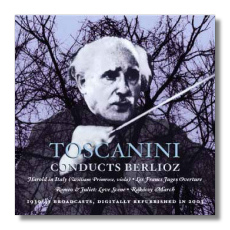
The Internet's Premier Classical Music Source
Related Links
- Berlioz Reviews
- Latest Reviews
- More Reviews
-
By Composer
-
Collections
DVD & Blu-ray
Books
Concert Reviews
Articles/Interviews
Software
Audio
Search Amazon
Recommended Links
Site News
 CD Review
CD Review
Hector Berlioz

Toscanini Conducts
- Harold in Italy
- Les Francs Juges Overture
- Roméo et Juliette: Love Scene
- La Damnation de Faust: Rákóczy March
William Primrose, viola
Unnamed orchestra/Arturo Toscanini
Music & Arts CD-4614 AAD monaural 72:36
As with earlier Toscanini releases from Music & Arts, Toscanini's most obvious competition is himself. His 1953 broadcast of Harold was commercially released by RCA and was reissued on CD (60275-2-RG). On that occasion, the soloist was Carlton Cooley, the principal violist of the NBC Symphony Orchestra. The present version with William Primrose is a revelation, however. Toscanini asked the great violist to learn Harold especially for this broadcast. (The date is variously given as January 2 and January 21, 1939.) Primrose would go on to make commercial recordings of this work with Serge Koussevitzky, Sir Thomas Beecham, and Charles Munch, and Toscanini would play it with Cooley, but the Toscanini/Primrose combination is quite special. Primrose has more character than Cooley, and Primrose never had more exacting leadership than he had with the Italian maestro. (The story goes that Toscanini heard Primrose's recording with Koussevitzky and remarked, "Poor Primrose," adding, "Next year he come to play this piece with me again, and he must play correct!" One guesses that Cooley was easier to mold than Primrose.) Although the tempos are approximately the same, this 1939 broadcast is tenser than the 1953 version, rhythmically sharper, more exciting, and more keenly felt. The dry and bass-deficient Studio 8H sound is a liability, however, compared to the later version, which was broadcast live from Carnegie Hall.
And then there are the remaining items, which all date from April 5, 1941. In his notes to the RCA CD, Harris Goldsmith refers to this interpretation of the Les Francs Juges Overture as "miraculous." This is not one of Berlioz's most acclaimed scores, but Toscanini really makes a case for it on this occasion, pulling together its sprawl, and emphasizing its epic and heroic qualities. The conductor loved Roméo et Juliette, and this performance is both tender and intense. He is more expansive here than on his commercially released recordings from 1947, but this is more a function of phrasing than of tempos, which are similar. Finally, the conductor's bracing Rákóczy March earns cheers from the audience, as well it should: Toscanini swaggers his way through it like a paprika-breathed Magyar, eschewing the overly solemn tempos favored by many latter day conductors. Again, the Studio 8H sonics are inferior, but the performances themselves carry the day.
The new audio restorations are by Graham Newton. Some of the sides (were these acetate discs?) are noisier than others, and there is some noticeable gain-riding in Harold, which probably was present in the original. Initially, you'll realize you're listening to recordings that are more than sixty years old, but chances are you'll forget about it as soon as Harold starts to get warmed up.
Among Music & Arts's recent Toscanini releases, this CD is particularly desirable.
Copyright © 2003, Raymond Tuttle


















